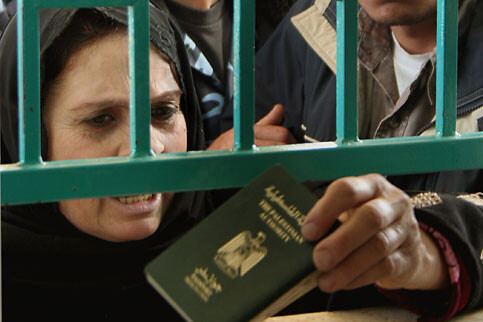IRIN 6 September 2006

Palestinians crossing between Gaza Strip and Egypt after the re-opening of Rafah border crossing. They were able to leave fenced-in Gaza without having to submit to Israeli security checks. (Mohamed Hamouda-APOLLO IMAGES/IRIN)
RAFAH — Israel’s continued closure of the Gaza Strip’s only international border crossing is isolating Gaza’s 1.4 million residents. As Gaza’s only international border crossing, Rafah is the only route for ordinary Palestinians to cross from Gaza to Egypt to go back to their jobs and universities across the world - and to get back in to see their families.
All other crossings into Israel have been closed since the start of a second intifada in 2000. Meaning ‘uprising’ in Arabic, an intifada is a campaign directed at ending Israeli military occupation.
Many stuck in Gaza face losing their jobs if they cannot travel when they planned to. Palestinians unable to cross into Egypt risk losing money spent on airline tickets from Cairo to countries in the Gulf and elsewhere.
When the border last opened on August 25 and 26, priority was given to sick and vulnerable people, many of whom were travelling to Egypt for medical treatment.
Only a few thousand Palestinians got through, though - alerted by television news and mobile phone messages from friends - masses rushed towards it.
“It was insanely crowded - about 10,000 people. Many people jumped up onto the roofs of buses arriving at the border, and a lot fell off again. I saw one guy fall on his head. They had to take him to hospital,” said Alaa Ajad, a 29-year-old border supervisor.
“Many people suffered sunstroke and exhaustion because they were waiting for hours without shelter,” he added.
Under the terms of Israel’s unilateral disengagement plan, signed on 25 November last year, Israel proposed to remove its presence from the Gaza Strip.
When it gave up control of the Rafah border crossing as part of the plan, Israel insisted that observers from the European Union be present at the crossing.
Between last November and 25 June this year, the border was open for an agreed eight hours a day, according to Maria Telleria, spokeswoman for the EU observers.
However, when Palestinian militants captured an Israeli soldier at the nearby Kerem Shalom crossing on 25 June, Israel shut Rafah immediately.
“When Corporal Gilad Shalit was kidnapped the situation changed dramatically. The Israelis say there is an emergency and under international law, if there is an emergency, the agreement can be changed,” said Telleria.
The border has since been opened on just seven occasions, Telleria said. Israel is able to decide when and how the crossing opens, because when it closes Kerem Shalom, it effectively prevents the EU observers reaching the Rafah crossing to monitor movement through it.
Shlomo Dror, spokesman for Israel’s Government Coordination Office, told IRIN: “When we left [Gaza], the idea was we would get out and have no control. But we had pressure from the Palestinians, the Europeans and the US to keep the customs envelope around Gaza. So we tried to find a way to have some control over what goes in and out of Gaza from Kerem Shalom.”
Dror added that Israel also has security concerns over the crossing. “If we see someone we don’t like, we ask the European observers to stop and check that person,” he said.
The year-long agreement to open Rafah will expire on November 24. After that date, Palestinians may find themselves completely trapped in Gaza. “Before the current situation, people were discussing the possibility of extending the agreement. But now, nobody has any idea what will happen,” said Telleria.
“The Israeli authorities are afraid Corporal Shalit will be transported through Rafah into Egypt,” said Telleria, adding that the EU observers are pushing to have the border re-opened.
Related Links